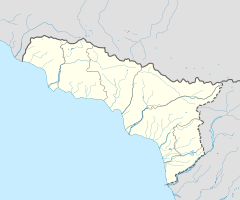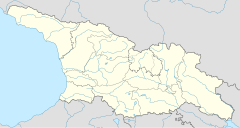Lykhny Church
| Church of Dormition of Lykhny ლიხნის ტაძარი (in Georgian) | |
|---|---|
 Church of Dormition of Lykhny | |
| Religion | |
| Affiliation | Georgian Orthodox |
| Province | Abkhazia[1] |
| Location | |
| Location | |
| Geographic coordinates | 43°08′23″N 40°37′04″E / 43.13972°N 40.61778°E |
| Architecture | |
| Type | Church |
| Completed | 10th century |
The Church of Dormition of Lykhny (Georgian: ლიხნის ტაძარი, romanized: likhnis t'adzari) is a medieval Orthodox Christian church in the village of Lykhny in Abkhazia/Georgia, built in the 10th century.[2]
History

Its 14th-century frescoes are influenced by the contemporary Byzantine art and adorned with more than a dozen of Georgian and Greek inscriptions.
The Lykhny church is a domed cross-in-square design, built of straight rows of well-refined ashlar stone. The small dome, with a low drum and a sloping roof,[3] is based on four freely standing piers. The western portion of the building includes an upper gallery. The façades are simple, apertured with windows and marked with three protruding apses protruding from the east wall. There are traces of the 10th-11th-century wall painting, but the extant cycle of frescoes date to the 14th century. They are characterized by neatly colored, dynamic, and expressive paintings of somewhat elongated human figures.[4][5]
The antiquities of Lykhny, then also known as Souk-Su, were first studied and published, in 1848, by the French scholar Marie-Félicité Brosset,[6] who also copied several medieval Georgian and Greek inscriptions from the Lykhny church. Of note is the Georgian inscription, in the asomtavruli script, relating the apparition of Halley's Comet in 1066, in the reign of Bagrat IV of Georgia.[4][5]
Efforts at conservation have been launched by the de facto Abkhaz authorities in 2010. The works, according to Georgian specialists, carry the risk of authenticity infringement. The Lykhny church is inscribed on Georgia's list of Monuments of National Significance.[5]
References
![]() Media related to Lykhny Church at Wikimedia Commons
Media related to Lykhny Church at Wikimedia Commons
- ^ The political status of Abkhazia is disputed. Having unilaterally declared independence from Georgia in 1992, Abkhazia is formally recognised as an independent state by 5 UN member states (two other states previously recognised it but then withdrew their recognition), while the remainder of the international community recognizes it as de jure Georgian territory. Georgia continues to claim the area as its own territory, designating it as Russian-occupied territory.
- ^ Church in Likhni village Historical monuments of Abkhazia — Government of the Autonomous Republic of Abkhazia.
- ^ Dzhanberidze, Nodar; Tsitsishvili, Irakli (1996). Architectural Monuments of Georgia. Stroyizdat. p. 11. ISBN 5274022235.
- ^ a b Constantinides, Efthalia C. (2007). "Wall Paintings in the Church of the Dormition of the Virgin at Lykhne, Abkhazia, Western Georgia". Images from the Byzantine Periphery: Studies in Iconography and Style. Alexandros Press. pp. 232–233. ISBN 978-9080647671.
- ^ a b c Gelenava, Irakli, ed. (2015). Cultural Heritage in Abkhazia (PDF). Tbilisi: Meridiani. pp. 34–37.
- ^ Brosset, Marie-Félicité (1851). Rapports sur un voyage archeologique dans la Georgie et dans l'Armenie, execute en 1847-1848 (in French). St.-Petersbourg: Impr. del'Acad. des sciences. p. 116.


